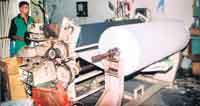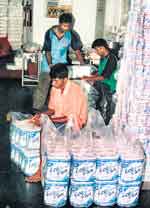Flora – flush with success Toilet paper is not a subject that comes up in many conversations, in fact unless the adverts are really cute it’s a subject that is hardly ever broached. But these days it’s one of those products that always gets put on the shopping list of most households.
Enter Pee Bee Management Services Ltd, the first company to produce toilet paper locally in its factory in Ratmalana way back in 1980, under the Flora brand name. It is also the first company to receive the SLS 798 from the Sri Lanka Standards Institute earlier this month for its toilet rolls. Before the factory, such products were being imported from China. The thing here is before the decision to manufacture the vast majority of the population was using water to do the necessaries when it came to personal hygiene. So where and how did the toilet roll revolution come about? And how does the company keep their 60 percent market share? Enter Kishore Surtani, Managing Director of Pee Bee, and his three brothers, all of whom still work for the company. From initially importing the paper products in 1977, the brothers decided to set up a manufacturing base. The reason for their belief was that there was a market, helped by the hotels catering for tourists and the “Colombo 7” brigade at that time. What is often overlooked is that there was another important group that helped secure the survival and growth of toilet papers: the migrant worker. As Mr. Surtani said, “Those who worked abroad as domestics in places like the Middle East and Singapore were, as time went on, westernised up to a point, and they came back spreading the word about toilet paper.” Many of the migrant workers came from poor families, and here was another help for the roll – a lack of running water in the villages. Thus, there were the workers spreading the news that there was a product that was hygienic and available.
But there were still problems, as there were no supermarkets when the factory began operations with three product lines, plus the middle class were still in a minority. Mr. Surtani reckoned that only 15 to 20 percent of the factory’s products were sold to the public then, where smaller shops considered toilet paper to be a luxury. The rest was sold to the industrial and service sectors. In the early 1980s, the factory’s lines were toilet paper, serviettes and facial tissues. At the time serviettes were the big sellers as Mr. Surtani said, “Sri Lankans like to party.” In those early days, imports of the virgin pulp were 500 tonnes a year, a figure that has now risen to 2,500, where one tonne can produce 1,000 toilet rolls. The monopoly helped, lasting until around 1985, where they could undercut their importing rivals due to the import tax they had to pay for finished goods. "To import, the product is bulky. It takes up a lot of container space, plus the tax duty was high. It was the time to take those things out of the equation,” the Managing Director said of the decision to set up shop locally. Initially there were two machines, where one still works, and a workforce of eight, where two still have a say in today’s running of the business. The raw material originally came from Indonesia, Malaysia and Thailand, and still does. The big boost came with the arrival of supermarkets around 1986-7, according to Mr. Surtani, where it was much easier to sell his paper line, especially in larger numbers, and with more guaranteed orders, beyond hospitals, hotels, and other industrial and service avenues. Today there are three production lines and a more diverse range of paper products. The reason is the move to the present factory in Homagama in 1991, where now a staff of 200 is employed, not to mention the need to supply the ever-growing demand for the products as the population began to better understand the hygienic nature of the products they were buying. At the factory there is great emphasis on everyone being part of a family, “thus it's important to keep the workforce happy. We have a variety of social activities within the factory, as well as with other companies in the industrial park. There is a cricket team, as well as inter-house events to help keep people motivated, and that's important,” the MD said. As for market share, plus the 10-15 percent growth, Mr. Surtani puts it down to the research and development side and innovation. From a starting range of three products that has expanded to a whole multitude of paper items, including derivations in between, such as perfumed and coloured tissues, and personalised tissue boxes for those in need. With five competitors now in the market, Flora puts its emphasis on quality, and as Mr. Surtani said, “That's what our customers want. We do our research and follow up on it. We have recently started a perfumed range.
What I like to think is that the perfume appeals to all, especially the poorer person who maybe can't afford a bottle of perfume but can spend Rs 13 on a packet of tissues and smell nice via a dab or two.” Pee Bee Management Services aims to introduce at least 10 new products a year, where this year, in March, it got the franchise to use Disney characters on its products. And this is the vision according to the company co-founder, “Anything that is paper and disposable, we want to be the best. And as for where we can go: seat and head rest covers, hospital masks and aprons, then there are diapers. The list just goes on.” As for receiving the SLS 798 certification for his toilet rolls, Mr. Surtani was very proud but he would like to see Sri Lanka have the same standard identifications for the other products his factory produces, but there is the expectation of an ISO standard before the end of the year. And let's not forget the two men still there: B. M. H. Walles was the original factory manager, and now, even though retired, is still a consultant. He is also proud that one of the original machines is still working, even if he has had to repair it once in a while — but if that isn't love for a job, I don't know what is. The second gent is Michael Gamage, who is still working and supervising the lines. So there you have it, a company that started a toilet and tissue brand name and still leads the market. Not a lot of companies can say that, and it seems Pee Bee will continue to roll out their products in the years to come.
|
||||||
Copyright © 2006 Wijeya Newspapers
Ltd. All rights reserved. |


